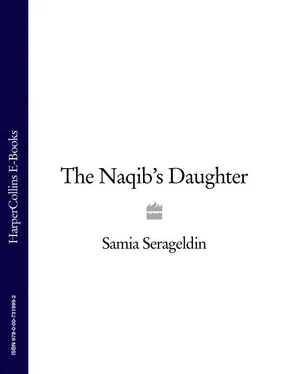The barely touched stuffed lamb was no sooner removed from the table than a succession of sweet pastries was proffered, and that was followed by another ritual of finger rinsing. Throughout, only water had been offered to drink. Nicolas found the local water, drawn from some three hundred public fountains around the city, to be quite acceptable. Finally the excellent Yemeni coffee was served, strong and thick as syrup, along with the long water pipes that were ubiquitous in the country. Nicolas noticed that the Egyptians seemed to take little delight in the pleasures of the table but were addicted to their coffee and tobacco.
Nicolas shifted again in his seat and rubbed his cramped left leg discreetly; Magallon, noticing his discomfort, invited him to take a stroll on the terrace to admire the view over the shallow lake. By now the Nile water that had been released with the breaching of the dam in the morning had come rushing through the khalig, the main canal, and was beginning to fill the Ezbekiah esplanade.
‘A pretty sight, is it not,’ the Consul smiled.
‘Rather like Venice,’ Nicolas concurred. ‘The Ezbekiah esplanade must be easily three times the size of the Place de la Révolution in Paris, wouldn’t you say?’ He breathed in the scented air and identified the separate fragrances of carob, eucalyptus, sycamore and lemon. A few slender boats with gay paper lanterns languorously crisscrossed the water, steered by gondoliers. ‘It must be a good sign that the locals are in a festive mood.’
‘Ah, but exactly – this scene before you is far more subdued than would typically be the case on such an occasion. There are very few Muslim people of quality among the revellers, other than the members of the diwan who are more or less constrained to be here. And it was the same this morning at the ceremony of the breaching of the Nile dam; mostly Ottoman Greeks, Syrian Christians, Copts. Not many Muslims, other than the street mob. And out here on the Ezbekiah; on a summer night, and a major festival, you would have seen many more boats, lights, music playing, and all the riverains would be out escaping the summer heat in the cool of the evening. Veiled Muslim ladies as well as men.’ Magallon made an expansive gesture that encompassed the view from the terrace as well as the banquet hall behind them. ‘All of this has the feel of a staged play to me.’
At that moment, as if marking the end of the first act of a play, General Bonaparte stood up and raised his hands and every head turned to his table. Bakri stood up as well. Nicolas and Magallon hurried back to their seats while the commandant prepared to speak.
‘As you know,’ he announced, ‘the post of chief syndic of the Prophet’s descendants is unoccupied.’ Given the circumstances under which the late holder of that title had been relieved of his duties, Nicolas was not surprised that Bonaparte made no reference to them. ‘I hereby invest an honourable member of that order, Shaykh Bakri, as the new Naqib Ashraf.’ Bonaparte beamed, kissed Bakri on both cheeks, draped a sable pelisse around his shoulders and bestowed a diamond ring upon him.
The fact that the interpreter did not feel the need to translate was an indication that the news did not come as a surprise to those in attendance; but not knowing the customs of the country better, Nicolas could not gauge the sober nods of the ulema. He did, however, catch a particularly dour, not to say sarcastic, twist of the lips on the face of Jabarti. Bakri seemed gratified and looked as if he had every intention of keeping the sable-trimmed red velvet pelisse on his shoulders, in spite of the stupefying August heat.
Bonaparte then sat down, somewhat anticlimactically, and Shaykh Bakri followed suit, clapping his hands, at which signal half a dozen young women filed into the hall, eyes downcast, carrying lutes and castanets. The French applauded with unfeigned enthusiasm. The Mamlukas, as white female slaves were called, took turns playing the instruments and dancing: a slow, sinuous, suggestive rolling of the hips and belly, although with none of the practised lasciviousness of the almées , the professional dancing girls, whom Nicolas had seen during the parade. Two of the girls who entered the banquet hall balanced four-branched candelabras on their heads as they danced, keeping the posture of their heads and necks absolutely still as their arms and hips swayed and the candles flickered. They were comely enough, Nicolas thought, fair complexioned if somewhat too generous in form, the chief attributes of beauty in the eyes of the Oriental, he had heard.
‘Rather opulent, don’t you think?’ he murmured to Magallon, under cover of the music.
‘Indeed. But you must know that some of our countrymen have developed a taste for these Mamlukas, faute de mieux . Lepère’ – he referred to the Director of Bridges and Pavements – ‘yesterday bought a Caucasian just arrived from Constantinople for three thousand six hundred pounds.’
Nicolas grimaced at the thought of a French Republican – and an engineer, at that! – purchasing a concubine in the slave market. But he had heard that although the troops frequented the filles publiques , officers and civilians of any rank spared themselves that unappetizing and insalubrious recourse and had been known either to buy Mamlukas in the open market or more often procure them during raids on the houses of the Mamlukes. Nicolas found such proceedings distasteful, but at least, he thought, it was some consolation that the women would surely be treated better by a Frenchman than they had been by their former masters.
‘General Dugua,’ Magallon whispered, ‘has taken a Mamluka from Murad Bey’s household, Fatoum by name, a lithesome beauty, apparently. But I will wager our Bonaparte is at no risk of succumbing to the charms of an odalisque. Did you not notice that little encounter that took place under your nose this morning?’
‘This morning I noticed nothing, I confess, but the rips in my balloon and the direction of the wind.’
‘No, of course. But everyone else noted that the general was quite taken with the delicious blonde Pauline Fourès. A milliner’s apprentice from Carcassonne by trade, and the wife of a lieutenant of the 22nd Chasseurs. But since she has a reputation pour avoir la cuisse légère , and we know how urgent our general is in matters of the heart, it would not surprise me if a first assignation had been planned for this very night.’
This casual gossip on the part of a diplomat like Magallon surprised Nicolas, but the ambassador’s indiscretions, regarding matters that were more or less public knowledge, seemed to be the tactic of an astute man seeking to gain the confidence of his interlocutor. Magallon’s comment explained the unexpected good humour of the commandant that evening. It was rather amusing to imagine Bonaparte dying of ennui as he reclined by Bakri’s side, his thoughts on an entirely more pleasant prospect awaiting him in his chamber in Elfi’s palace.
Shaykh Bakri clapped his hands and the dancers filed out. Bonaparte stretched his legs and showed signs of bringing the evening to a close. But then the third act, as Nicolas thought of it, came to a startling conclusion. A last cup was to be served, apparently, at a signal from the host. A young girl of about twelve or thirteen entered, carrying a tray with cups of the honeyed concoction called almond milk, and Shaykh Bakri introduced her as his youngest daughter.
A little chubby in the cheeks and under the chin, in the manner of children, she had enormous liquid eyes, with eyebrows like a bird in flight. She gave off a strong perfume of gardenia, and no doubt had been sprinkled liberally with the essence before being sent before the guests. Intimidating as the occasion must have been for the child, she nevertheless could not resist darting curious glances at the French from under the impossibly long, thick lashes some Egyptians had. Nicolas found himself reminded of one of his own children – not his blonde and languid Madelon, not in the least, but rather irrepressible little Cola with his bold black eyes.
Читать дальше












